- Home
- Thomas Harris
Red Dragon hl-1 Page 15
Red Dragon hl-1 Read online
Page 15
“How did you find out?”
“The ad manager came to me. Said yourChicagooffice sent this suit-of-clothes over to check the ads. Your guy took five letters from the incoming ads. Said it was ‘pursuant to mail fraud.’ Mail fraud nothing. The ad manager made Xerox copies of the letters and envelopes before he let your guy have them.
“I looked them over. I knew he took five letters to smokescreen the one he really wanted. Took a day or two to check them all out. The answer was on the envelope.Chesapeakepostmark. The postage-meter number was forChesapeakeStateHospital. I was over there you know, behind your friend with the wild hair up his ass. What else could it be?
“I had to be sure, though. Thats why I called to see if you’d come down on ‘Mr. Pilgrim’ with both feet, and you did.”
“You made a large mistake Freddy.”
“You need the Tattler and l can open it up for you. Ads, editorial, monitoring incoming mail, anything. You name it. Ican be discreet. I can. Cut me in, Crawford.”
“There’s nothing to cut you in on.”
“Okay, then it won’t make any difference if somebody happened to put in six personal ads next issue. All to ‘Mr. Pilgrim’ and signed the same way.”
“I’ll get an injunction slapped on you and a sealed indictment for obstruction of justice.” “And it might leak to every pape in the country.” Lounds knew he was talking on tape. He didn’t care anymore. “I swear to God I’ll do it, Crawford. I’ll tear up your chance before I lose mine.”
“Add interstate transmition of a threatening message to what I just said.”
“Let me help you, Jack. I can, believe me.”
“Run along to the police station, Freddy. Now put the sergeant back on the phone.”
* * *
Freddy Lounds’s Lincoln Versailles smelled of hair tonic and aftershave, socks and cigars, and the police sergeant was glad to get out of it when they reached the station house.
Lounds knew the captain commanding the precinct and many of the patrolmen. The captain gave Lounds coffee and called theU.S.attorney’s office to “try and clear this shit up.”
No federal marshal came for Lounds. In half an hour he took a call from Crawford in the precinct commander’s office. Then he was free to go. The captain walked him to his car.
Lounds was keyed up and his driving was fast and jerky as he crossed the Loop eastward to his apartrnent overlookingLake Michigan. There were several things he wanted out of this story and he knew that he could get them. Money was one, and most of that would come from the paperback. He would have an instant paperback on the stands thirty-six hours after the capture. An exclusive story in the daily press would be a news coup. He would have the satisfaction of seeing the straight press—the Chicago Tribune, the Los Angeles Times, the sanctified Washington Post and the holy New York Times—run his copyrighted material under his byline with his picture credits.
And then the correspondents of those august journals, who looked down on him, who would not drink with him, could eat their fucking hearts out.
Lounds was a pariah to them because he had taken a different faith. Had he been incompetent, a fool with no other resource, the veterans of the straight press could have forgiven him for working on the Tattler, as one forgives a retarded geek. But Lounds was good. He had the qualities of a good reporter—intelligence, guts, and the good eye. He had great energy and patience.
Against him were the fact that he was obnoxious and therefore disliked by news executives, and his inability to keep himself out of his stories.
In Lounds was the lunging need to be noticed that is often miscalled ego. Lounds was lumpy and ugly and small. He had buck teeth and his rat eyes had the sheen of spit on asphalt.
He had worked in straight journalism for ten years when he realized that no one would ever send him to the White House. He saw that his publishers would wear his legs out, use him until it was time for him to become a broken-down old drunk manning a dead-end desk, drifting inevitably toward cirrhosis or a mattress fire.
They wanted the information he could get, but they didn’t want Freddy. They paid him top scale, which is not very much money if you have to buy women. They patted his back and told him he had a lot of balls and they refused to put his name on a parking place.
One evening in 1969 while in the office working rewrite, Freddy had an epiphany.
Frank Larkin was seated near him taking dictation on the telephone. Dictation was the glue factory for old reporters on the paper where Freddy worked. Frank Larkin was fifty-five, but he looked seventy. He was oystereyed and he went to his locker every half-hour for a drink. Freddy could smell him from where he sat.
Larkin got up and shuffled over to the slot and spoke in a hoarse whisper to the news editor, a woman. Freddy always listened to other people’s conversatious.
Larkin asked the woman to get him a Kotex from the machine in the ladies’ room. He had to use them on his bleeding behind.
Freddy stopped typing. He took the story out of his typewriter, replaced the paper and wrote a letter of resignation.
A week later he was working for the Tattler .
He started as cancer editor at a salary nearly double what he had earned before. Management was impressed with his attitude.
The Tattler could afford to pay him well because the paper found cancer very lucrative.
One in five Americans dies of it. The relatives of the dying, worn out, prayed out, trying to fight a raging carcinoma with pats and banana pudding and copper-tasting jokes, are desperate for anything hopeful.
Marketing surveys showed that a bold “New Cure for Cancer” or “Cancer Miracle Drug” cover line boosted supermarket sales of any Tattler issue by 22.3 percent. There was a six-percentile drop in those sales when the story ran on pageone beneath the cover line, as the reader had time to scan the empty text while the groceries were being totaled.
Marketing experts discovered it was better to have the big cover line in color on the front and play the story in the middle pages, where it was difficult to hold the paper open and manage a purse and grocery cart at the same time.
The standard story featured an optimistic five paragraphs in ten-point type, then a drop to eight point, then to six point before mentioning that the “miracle drug” was unavailable or that animal research was just beginning.
Freddy earned his money turning them out, and the stories sold a lot of Tattlers .
In addition to increased readership, there were many spinoff sales of miracle medallions and healing cloths. Manufacturers of these paid a premium to get their ads located close to the weekly cancer story.
Many readers wrote to the paper for more information. Some additional revenue was realized by selling their names to a radio “evangelist,” a screaming sociopath who wrote to them for money, using envelopes stamped “Someone You Love Will Die Unless…”
Freddy Lounds was good for the Tattler , and the Tattler was good to him. Now, after eleven years with the paper, he earned $72,000 a year. He covered pretty much whathe pleased and spent the money trying to have a good time. He lived as well as he knew how to live.
The way things were developing, he believed he could raise the ante on his paperback deal, and there was movie interest. He had heard thatHollywoodwas a fine place for obnoxious fellows with money.
Freddy felt good. He shot down the ramp to the underground garage in his building and wheeled into his parking place with a spirited squeal of rubber. There on the wall was his name in letters a foot high, marking his private spot. Mr. Frederick Lounds.
Wendy was here already—her Datsun was parked next to his space. Good. He wished he could take her toWashingtonwith him. That would make those flatfeet’s eyes pop. He whistled in the elevator on his way upstairs.
* * *
Wendy was packing for him. She had lived out of suitcases and she did a good job.
Neat in her jeans and plaid shirt, her brown hair gathered in a chipmunk tail on her neck, she might have
been a farm girl except for her pallor and her shape. Wendy’s figure was almost a caricature of puberty.
She looked at Lounds with eyes that had not registered surprise in years. She saw that he was trembling.
“You’re working too hard, Roscoe.” She liked to call him Roscoe, and it pleased him for some reason. “What are you taking, the six-o’clock shuttle?” She brought him a drink and moved her sequined jump suit and wig case off the bed so he could lie down. “I can take you to the airport. I’m not going to the club ‘til six.”
“WendyCity” was her own topless bar, and she didn’t have to dance anymore. Lounds had cosigned the note.
“You sounded like Morocco Mole when you called me,” she said.
“Who?”
“You know, on television Saturday morning, he’s real mysterious and he helps Secret Squirrel. We watched it when you had the flu… You really pulled one off today, didn’t you? You’re really pleased with yourself.”
“Damn straight. I took a chance today, baby, and it paid off. I’ve got a chance at something sweet.”
“You’ve got time for a nap before you go. You’re running yourself in the ground.”
Lounds lit a cigarette. He already had one burning in the ashtray.
“You know what?” she said. “I bet if you drink your drink and get it off, you could go to sleep.”
Lounds’s face, like a fist pressed against her neck, relaxed at last, became mobile as suddenly as a fist becomes a hand. His trembling stopped. He told her all about it, whispering into the buck jut of her augmented breasts; she tracing eights on the back of his neck with a finger.
“That is some kind of smart, Roscoe,” she said. “You go to sleep now. I’ll get you up for the plane. It’ll be all right, all of it. And then we’ll have a high old time.”
They whispered about the places they would go. He went to sleep.
Chapter 17
Dr. Alan Bloom and Jack Crawford sat on folding chairs, the only furniture left in Crawford’s office.
“The cupboard is bare, Doctor.”
Dr. Bloom studied Crawford’s simian face and wondered what was coming. Behind Crawford’s grousing and his Alka-Seltzers the doctor saw an intelligence as cold as an X-ray table.
“Where did Will go?”
“He’ll walk around and cool off,” Crawford said. “He hates Lounds.”
“Did you think you might lose Will after Lecter published his home address? That he might go back to his family?”
“For a minute, I did. It shook him.”
“Understandably,” Dr. Bloom said.
“Then I realized—he can’t go home, and neither can Molly and Willy, never, until the Tooth Fairy is out of the way.”
“You’ve met Molly?”
“Yeah. She’s great, I like her. She’d be glad to see me in hell with my back broken, of course. I’m having to duck her right now.”
“She thinks you use Will?”
Crawford looked at Dr Bloom sharply. “I’ve got some things I have to talk to him about. We’ll need to check with you. When do you have to be atQuantico?”
“Not until Tuesday morning. I put it off.” Dr. Bloom was a guest lecturer at the behavioral-science section of theFBIAcademy.
“Graham likes you. He doesn’t think you run any mind games on him,” Crawford said. Bloom’s remark about using Graham stuck in his craw.
“I don’t. I wouldn’t try,” Dr. Bloom said. “I’m as honest with him as I’d be with a patient.”
“Exactly.”
“No, I want to be his friend, and I am. Jack, I owe it to my field of study to observe. Remember, though, when you asked me to give you a study on him, I refused.”
“That was Petersen, upstairs, wanted the study.”
“You were the one who asked for it. No matter, if I ever did anything on Graham, if there were ever anything that might be of therapeutic benefit to others, I’d abstract it in a form that would be totally unrecognizable. If I ever do anything in a scholarly way, it’ll only be published posthumously.”
“After you or after Graham?”
Dr. Bloom didn’t answer.
“One thing I’ve noticed—I’m curious about this: you’re never alone in a room with Graham, are you? You’re smooth about it, but you’re never one-on-one with him. Why’s that? Do you think he’s psychic, is that it?”
“No. He’s an eideteker —he has a remarkable visual memory—but I don’t think he’s psychic. He wouldn’t let Duke test him—that doesn’t mean anything, though. He hates to be prodded and poked. So do I.”
“But-“
“Will wants to think of this as purely an intellectual exercise, and in the narrow definition of forensics, that’s what it is. He’s good at that, but there are other people just as good, I imagine.”
“Not many,” Crawford said.
“What he has in addition is pure empathy and projection,” Dr. Bloom said. “He can assume your point of view, or mine—and maybe some other points of view that scare and sicken him. It’s an uncomfortable gift, Jack. Perception’s a tool that’s pointed on both ends.”
“Why aren’t you ever alone with him?”
“Because I have some professional curiosity about him and he’d pick that up in a hurry. He’s fast.”
“If he caught you peeking, he’d snatch down the shades.”
“An unpleasant analogy, but accurate, yes. You’ve had sufficient revenge now, Jack. We can get to the point. Let’s make it short. I don’t feel very well.”
“A psychosomatic manifestation, probably,” Crawford said. “Actually it’s my gall bladder. What do you want?”
“I have a medium where I can speak to the Tooth Fairy.”
“The Tattler ,” Dr. Bloom said.
“Right. Do you think there’s any way to push him in a self-destructive way by what we say to him?”
“Push him toward suicide?”
“Suicide would suit me fine.”
“I doubt it. In certain kinds of mental illness that might be possible. Here, I doubt it. If he were self-destructive, he wouldn’t be so careful. He wouldn’t protect himself so well. If he were a classic paranoid schizophrenic, you might be able to influence him to blow up and become visible. You might even get him to hurt himself. I wouldn’t help you though.” Suicide was Bloom’s mortal enemy.
“No, I suppose you wouldn’t,” Crawford said. “Could we enrage him?”
“Why do you want to know? To what purpose?”
“Let me ask you this: could we enrage him and focus his attention?”
“He’s already fixed on Graham as his adversary, and you know it. Don’t fool around. You’ve decided to stick Graham’s neck out, haven’t you?”
“I think I have to do it. It’s that or he gets his feet sticky on the twenty-fifth. Help me.”
“I’m not sure you know what you’re asking.”
“Advice—that’s what I’m asking.”
“I don’t mean from me,” Dr. Bloom said. “What you’re asking from Graham. I don’t want you to misinterpret this, and normally I wouldn’t say it, but you ought to know: what do you think one of Will’s strongest drives is?”
Crawford shook his head. “It’s fear, Jack. The man deals with a huge amount of fear.” “Because he got hurt?”
“No, not entirely. Fear comes with imagination, it’s a penalty, it’s the price of imagination.”
Crawford stared at his blunt hands folded on his stomach. He reddened. It was embarrassing to talk about it. “Sure. It’s what you don’t ever mention on the big boys’ side of the playground, right? Don’t worry about telling me he’s afraid. I won’t think he’s not a ‘stand-up guy.’ I’m not a total asshole, Doctor.”
“I never thought you were, Jack.”
“I wouldn’t put him out there if I couldn’t cover him. Okay, if I couldn’t cover him eighty percent. He’s not bad himself, Not the best, but he’s quick. Will you help us stir up the Tooth Fairy, Doctor? A lot of
people are dead.”
“Only if Graham knows the entire risk ahead of time and assumes it voluntarily. I have to hear him say that.”
“I’m like you, Doctor. I never bullshit him. No more than we all bullshit each other.”
* * *
Crawford found Graham in the small workroom near Zeller’s lab which he had commandeered and filled with photographs and personal papers belonging to the victims.
Crawford waited until Graham put down the Law Enforcement Bulletin he was reading.
“Let me fill you in on what’s up for the twenty-fifth,” He did not have to tell Graham that the twenty-fifth would bring the next full moon.
“When he does it again?”
“Yeah, if we have a problem on the twenty-fifth.”
“Not if. When.”
“Both times it’s been on Saturday night.Birmingham, June 28, a full moon falling on a Saturday night. It was July 26 inAtlanta, that’s one day short of a full moon, but also Saturday night. This time the full moon falls on Monday, August 25. He likes the weekend, though, so we’re ready from Friday on.”
“Ready? We’re ready?”
“Correct. You know how it is in the textbooks—the ideal way to investigate a homicide?”
“I never saw it done that way,” Graham said. “It never works out like that.”
“No. Hardly ever. It would be great to be able to do it, though: Send one guy in. Just one. Let him go over the place. He’s wired and dictating all the time. He gets the place absolutely cherry for as long as he needs. Just him… just you.”
A long pause.
“What are you telling me?”
“Starting the night of Friday, the twenty-second, we have a Grumman Gulfstream standing by at Andrews Air Force Base. I borrowed it from Interior. The basic lab stuff will be on it. We stand by—me, you, Zeller, Jimmy Price, a photographer, and two people to do interrogations. Soon as the call comes in, we’re on our way. Anywhere in the East or South, we can be there in an hour and fifteen minutes.”

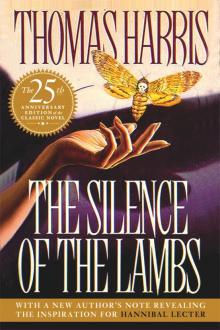 The Silence of the Lambs
The Silence of the Lambs Red Dragon
Red Dragon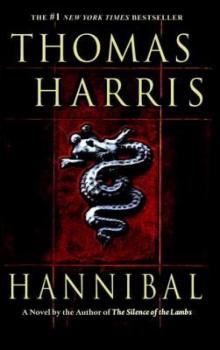 Hannibal
Hannibal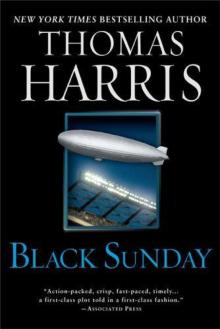 Black Sunday
Black Sunday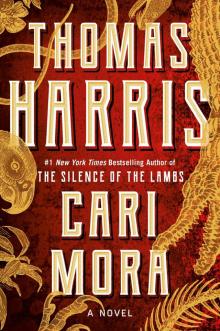 Cari Mora
Cari Mora Hannibal Rising
Hannibal Rising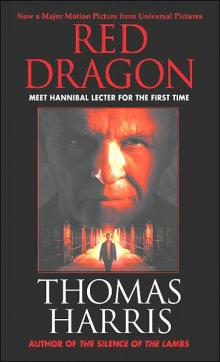 Red Dragon hl-1
Red Dragon hl-1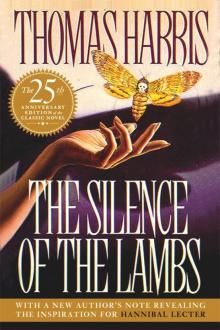 The Silence of the Lambs (Hannibal Lecter)
The Silence of the Lambs (Hannibal Lecter)